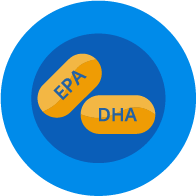Table of Contents
- The Essential Guide to Choosing Fish Oil Supplements:
- 1. Omega-3 Serving Size
- 2. Bioavailability
- A. Diverse Forms of Omega-3s:
- B. The Case for Emulsified Fish Oil:
- C. Beyond Fish Oil – Algae Oil:
- 3. Sustainability
- A. Overfishing:
- B. Habitat Destruction:
- C. Contamination Risks:
- 4. Freshness
- A. Deciphering Freshness from Labels:
- B. Monitoring Your Supplements Post-Purchase:
- Algae Oil: A Sustainable and Potent Alternative to Fish Oil
Increasing your omega-3 intake is a proven way to bolster heart health, and fish oil supplements have emerged as the go-to solution for many. These capsules, packed with omega-3 fatty acids, not only support cardiovascular wellness but also may help combat inflammation, making them a favorite among health enthusiasts.*
But with the myriad of fish oil supplements flooding the market, each claiming to be the best, how do you sift through the noise? The sheer number of brands and their varying claims can be dizzying. If you've ever found yourself staring at a store shelf, overwhelmed by choices, you're not alone.
Let’s dive into the key factors you should consider when buying fish oil supplements, ensuring you make an informed decision tailored to your health needs.
The Essential Guide to Choosing Fish Oil Supplements:
1. Omega-3 Serving Size

When browsing fish oil supplements, the foremost detail to notice is the omega-3 fatty acid content in each serving.
Fish oil has gained popularity as a dietary supplement due to its rich content of EPA and DHA. These specific omega-3 fatty acids are renowned for their potential benefits in addressing various health concerns, including cardiovascular health, cognitive function, mental well-being, and muscle recovery.*
While there isn't a universally accepted daily recommendation for fish oil, aiming for a daily intake of at least 1g (or 1000 mg) of combined EPA and DHA is a good benchmark. This is especially crucial if heart health is your primary concern. Of course, it's always wise to consult with a healthcare professional for personalized advice.
Labels can be tricky. Some supplements might advertise "1g of fish oil" on the front, but skimp on the actual omega-3 content when you read the fine print. Don't get misled by the total fish oil quantity. Instead, scrutinize the label to ensure you're getting a substantial amount of EPA and DHA in each serving. It's these specific fatty acids, not just any component of the oil, that deliver the health benefits you seek.
2. Bioavailability

While the quantity of omega-3s in a supplement is crucial, how efficiently our bodies utilize these nutrients is equally paramount. This efficiency is termed as 'bioavailability' – the proportion of the active ingredient that enters the bloodstream when introduced into the body and is made available for use.
Simply put, a supplement brimming with EPA and DHA doesn't guarantee that all of it is usable by your body. The form in which these omega-3s are presented plays a pivotal role in their absorption.
A. Diverse Forms of Omega-3s:
Omega-3s in supplements come in various molecular structures, such as natural triglycerides, ethyl esters, and re-esterified triglycerides. Among these, ethyl esters undergo a unique manufacturing process, resulting in them being less bioavailable compared to their counterparts. For those seeking optimal absorption, supplements in the triglyceride or free fatty acid form might be a superior choice.
B. The Case for Emulsified Fish Oil:
Research indicates that emulsified fish oil supplements, often in liquid form, might be absorbed more effectively than traditional capsules. If you're keen on maximizing the intake of your healthy fats, this could be a noteworthy consideration.
C. Beyond Fish Oil – Algae Oil:
Diversifying your omega-3 sources can also enhance bioavailability. Algae oil supplements, for instance, are not only rich in omega-3s but also display a bioavailability comparable to whole food sources like salmon. This fish-free alternative is a testament to the fact that the world of omega-3 supplements is broader than one might think.
3. Sustainability
When it comes to fish oil supplements, it's not just about health benefits. The origin of the fish oil and the environmental repercussions of its production are vital considerations.
With the surging demand for fish oil in recent years, our oceans face a significant toll. Astonishingly, the harvesting of fatty fish for oil demands millions of tons of marine life annually. This has raised alarms regarding overfishing, habitat degradation, and the risks of contamination — concerns that resonate both for our planet and individual health.

A. Overfishing:
Industrial-scale fishing practices, predominant in fish oil production, pose a threat to the delicate balance of marine ecosystems. Such intense fishing disrupts oceanic food chains, inadvertently kills other marine species, and can devastate whole marine habitats.
B. Habitat Destruction:
The aquaculture industry, which encompasses fish oil production, has its set of environmental concerns. Issues range from escaped farmed fish potentially mingling with wild populations to the alteration of natural landscapes due to fisheries. Moreover, waste from fish farms can deplete oxygen levels in surrounding waters, further harming marine life.
C. Contamination Risks:
Beyond environmental concerns, the production methodology for some fish oils might lead to contamination. Heavy metals, such as mercury, could find their way into the supplements. Consuming these in substantial amounts can have detrimental health effects.
Given the magnitude of these concerns, some experts advocate reconsidering fish oil consumption, especially when evaluating the environmental costs against the health gains.
While all fish oil supplements have an environmental footprint, informed choices can minimize the impact. Opting for supplements that carry certifications, like the Marine Stewardship Council Standard, ensures that fish oil originates from sustainable practices.
Alternatively, sustainable omega-3 sources like algae oil present a viable option. They deliver the desired health benefits without the environmental challenges linked to traditional fishing.
4. Freshness

Unlike many dietary supplements, fish oil has a limited shelf life. Rich in omega-3 fatty acids, these supplements are vulnerable to oxidation, which can be exacerbated by factors like prolonged storage, fluctuating temperatures, and exposure to light.
A. Deciphering Freshness from Labels:
Visually determining the freshness of a fish oil supplement can be challenging. To ensure you're purchasing a fresh product:
- Check the Expiry Date: A straightforward but essential step. Always ensure the supplement is within its recommended usage period.
- Look for Antioxidants: Some fish oil supplements contain added antioxidants that can help stave off oxidation. If present, this can be an indication of a product designed for longer shelf stability.
B. Monitoring Your Supplements Post-Purchase:
Even after purchase, it's essential to monitor your fish oil supplements for signs of deterioration. A telltale sign of spoiled fish oil is a strong, rancid odor. If you detect such a smell, it's best to discard the product.
Fish oil isn't the sole source of DHA and EPA. Besides its environmental implications and challenges with freshness, fish oil might not align with plant-based lifestyles. Additionally, potential contamination with heavy metals adds another layer of concern. If these factors resonate with you, remember there are alternative sources of omega-3s that might better suit your preferences and values.
Algae Oil: A Sustainable and Potent Alternative to Fish Oil

While fish oil supplements reign supreme in the world of omega-3s, they're not the sole contender. Enter algae oil — a powerhouse of nutrients and an environmentally conscious choice.
Algae oil doesn't just match fish oil in terms of nutrient density; it excels in sustainability. By choosing this alternative, you sidestep the environmental issues linked with overfishing and habitat destruction.
What sets algae-based omega-3 supplements apart? Here's a rundown:
- Eco-Friendly: Algae oil's production doesn't strain marine ecosystems, making it a sustainable choice.
- Plant-Based Friendly: Whether you're vegetarian, vegan, or simply prefer plant-based options, algae oil supplements fit seamlessly into your lifestyle.
- Nutrient-Rich: Packed with essential omega-3 fatty acids like EPA and DHA, algae oil supplements ensure you don't compromise on health.*
- High Bioavailability: Just like fish oil, the omega-3s from algae oil are readily absorbed by the body, maximizing their health benefits.*
In your pursuit of the ideal omega-3 supplement, don't overlook algae oil. It promises a harmonious blend of health benefits and conscious living, making it a worthy addition to your wellness routine.


